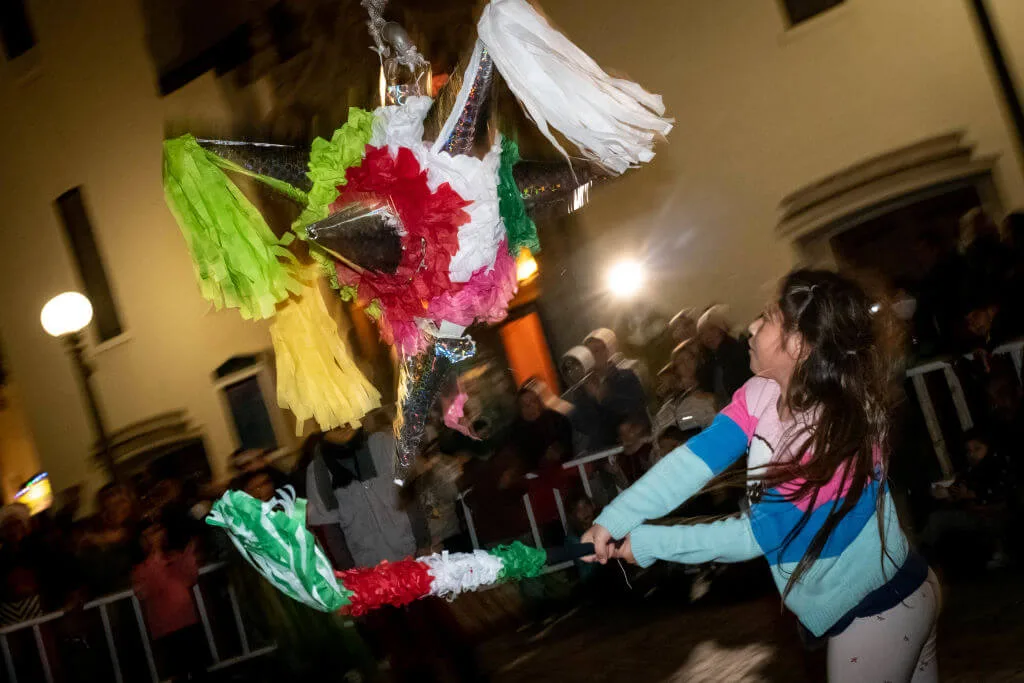
Los Angeles, CA - December 22:Children take turns smashing a piñata at Olvera Street in Los Angeles Thursday, December 22, 2022. The piñata is part of the Las Posadas nightly procession from Dec. 16-23 which includes statues of Mary and Joseph being carried making stops at businesses along the street. (Photo by David Crane/MediaNews Group/Los Angeles Daily News via Getty Images)
Posadas are like Christmas caroling, except our tradition is more like a fiesta—and we wouldn’t have it any other way!
For many in the Latino community, celebrating the birth of Jesus Christ doesn’t solely happen on Christmas Day. Instead, we like to commemorate the entire journey that Joseph and Mary made from Nazareth to Bethlehem—by having a Christmas party for nine straight days, otherwise known as posadas. Posadas can be considered the equivalent of Christmas caroling, except our tradition is more like a fiesta.
The word “posada” is Spanish for lodging, accommodation, inn, etc. This religious festival is celebrated in Mexico and the US, begins on Dec. 16, and lasts through Dec. 24—nine days leading up to the birth of Jesus.
However, posadas can generally take place any time during the month of December because who doesn’t love holiday parties? And, just like Easter, Latinos like to go all out when it comes to posadas, which means reenacting scenes that involve Jesus, Mary, and Joseph will most likely be part of the fiesta.

Los Angeles, CA – December 22:Visitors watch the Las Posadas procession along Olvera Street in Los Angeles Thursday, December 22, 2022. The Las Posadas nightly procession from Dec. 16-23 includes statues of Mary and Joseph being carried making stops at businesses along the street. (Photo by David Crane/MediaNews Group/Los Angeles Daily News via Getty Images)
The purpose of posadas is to commemorate the journey that Joseph and Mary made from Nazareth to Bethlehem in search of a safe refuge where Mary could give birth to the baby Jesus. When they were unable to find lodging in Bethlehem, Joseph and Mary were forced to seek shelter in a stable where the Christ Child was born.
I have fond memories of participating in posadas, where people would dress up and lead a procession to various houses (typically to people who are expecting you). A child dressed as an angel would lead the procession, with musicians and singers following behind, and we’d all have a candle in hand.
We’d sing outside someone’s home with the hope that they’d give us shelter—just like how Joseph and Mary asked for lodging. But this ritual doesn’t always include a warm welcome. Just as Joseph and Mary were rejected during their journey, posada participants may have to go to another house until someone lets them in. It’s a scripted tradition but fun for children because sometimes we had no idea if anyone would let us in!

Los Angeles, CA – December 22:Singers in traditional costume are part of the Las Posadas along Olvera Street in Los Angeles Thursday, December 22, 2022. The Las Posadas nightly procession from Dec. 16-23 includes statues of Mary and Joseph being carried making stops at businesses along the street. (Photo by David Crane/MediaNews Group/Los Angeles Daily News via Getty Images)
Eventually, when a host lets in the people in the procession, they are welcomed with warm treats like hot chocolate, champurrado, or pan dulce—and if they’re really lucky, they get to break a piñata.
Posadas are a joyful participatory event that allows people to gather during the holidays and sing holiday songs. It’s OK to make the event all your own, so feel free to sing any holiday song you want!
Depending on the guests and organizers, you can make a posada super religious or not, which means you can include scripture verses during or after the singing or leave them out.
Posadas can be whatever you’d like, but always remember to be respectful and not make a mockery of this beautiful Latino tradition. That means don’t wear stereotypical Mexican attire, and if you don’t know the Spanish songs, just stick to the English holiday songs.
READ MORE: 16 Arizona nonprofits to support this holiday season
Politics

New Biden rules deliver automatic cash refunds for canceled flights, ban surprise fees
In the aftermath of a canceled or delayed flight, there’s nothing less appealing than spending hours on the phone waiting to speak with an airline...

Trump says he would allow red states to track pregnancies, prosecute abortion ban violators
In an interview published by Time magazine this week, former president Donald Trump detailed his plans for a potential second term and said he would...
Local News

Maricopa County is hiring over 2,000 workers for the 2024 primary election
You can register to vote or check your voter registration at the Maricopa County Elections website. Maricopa County is hiring over 2,000 temporary...

Arizona’s Democratic governor signs a bill to repeal 1864 ban on most abortions
PHOENIX (AP) — Democratic Arizona Gov. Katie Hobbs has relegated a Civil War-era ban on most abortions to the past by signing a repeal bill...






